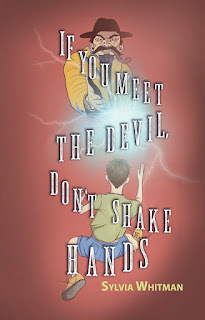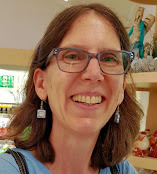Interview with Sylvia Whitman, Author of If you Meet the Devil, Don't Shake Hands

Welcome to Smack Dab in theMiddle! Please give us a brief description of If You Meet the Devil, Don’tShake Hands:
Twelve-year-old Gavin Baker, sonof a warrior, is a born worrier. With his father serving in the Army overseas,Gavin assumes that he’s already imagined the worst that can happen—until heshakes hands with his best friend Javi’s long-lost grandfather and findshimself trapped in the old magician’s ailing body.
Help! As the trickster takes overGavin’s life, fooling the girl of his dreams and even his own family, Gavinwonders if the imposter is a better version of Gavin than Gavin himself. He hasto convince Javi that the real Gavin now has hairy knuckles and a love of PabloNeruda’s poetry. Then the boys can try some tricks of their own. But will thetwo friends be able to reverse the old devil’s magic? Or will both of theirfamilies get their hearts broken?
As a child of the ‘80s, I had somuch fun with this–I grew up loving the switching-body movies (Vice Versa, Allof Me, Like Father, Like Son, etc.) Where did the idea of this body-switchingstory come from?
Body swapping’s not a new storyidea, but I think that’s because we’re all grappling with how to live withinour bodies. They’re both us and not us at the same time. Think about childrencalled “old souls” and seniors who are “young at heart.” The late cosmologistSteven Hawkins “embodied” this idea: He kept educating the world about theuniverse with intellectual rigor despite a body impaired by theneurodegenerative disease ALS.
Anxious Gavin goes to extremes totry to control his environment in my novel. But when he finds “himself” insidean ailing old man, he confronts an existential question (if we want to get allphilosophical): How much do we control our bodies, and how much do they controlus—and how other people see us?
I teach a class about writingpicture books, and when I do a brainstorming guided meditation with mystudents, I have them think about how their bodies changed in childhood—teethfalling out, scabs forming, arms breaking, hair coming in, etc. As I age, Inotice my body changing too. In a sense we’re body-switching all our lives.
You write in a variety ofmarkets, for a variety of ages–even academic work. Why MG?
MG readers combine the wonder ofthe picture book audience with more independent thinking. They’re willing tosuspend disbelief—but also to question characters’ choices.
And screens haven’t totallyhighjacked the attention of tweens. The ones I know read for real pleasure.
I instantly fell in love withGavin’s voice–I loved the facts he rattles off about insomnia, salmonella,etc., etc. I think MG-aged readers just delight in weird, random facts. Theypick up so much (and remember it). Do you find this to be true as well? Didinteractions with MG-aged children help shape Gavin?
Confession: I still love weird,random facts.
I have two kids, and althoughtheir middle-school years are barely visible in the rearview mirror, I dorecall their curiosity, delightful for being unjaded. The world was still newand awaiting discovery. I’ve attended many a kidslit conference, and I rememberhearing that boys really glom onto nonfiction. They devour encyclopedias coverto cover. That was somewhat true in my family. While my daughter leaned intohuman drama, my son pursued knowledge for knowledge’s sake.
Now that children’s books have takensuch innovative approaches to nonfiction and worked against genderingchildren’s interests, I’m hopeful that readers can find something that excitesthem in almost every book—a narrative arc in STEM or history books and weird(but researched!) facts in a novel with some magic in it.
Speaking of voice, I know you’reset to teach a workshop on voice and AI in the coming weeks. Can you speak tothis a bit here?
I’m looking forward to speakingat Florida WritersCon 2023, both in a regular session and at the NextGenWriters Experience, “a conference within the conference” for middle- andhigh-school students.
I’ve heard agents and editors atconferences say that voice sells a manuscript. A compelling voice keeps themturning pages even if they foresee that they need to work with an author ondeveloping characters or refining plot. Voice is almost synonymous withoriginality.
My college’s creative writingprogram is embracing AI as a tool, so we’re playing with various platforms inclasses to see where AI might enhance rather than usurp human creativity. Ifyou prompt ChatGPT with a story idea, for instance, it spews trite and genericnarratives. More informed prompting can give more useful results forbrainstorming, but I have yet to read something gripping. Voice seemsintimately connected with emotion and identity, which chatbots lack.
Just for the record, I’m notcreating AI-generated work, and the only assistance I’m considering at themoment involves research and revision feedback, along the lines of “summarizemy key points.” I enjoy the process of writing, so I don’t want to outsourcethat or let my “writing muscles” go flabby.
I love the scene where Gavintries to figure out what he wants most–how he goes through a list, and the firstthings that come to mind are some of the least important. He has to dig downthe list to find the things that matter the most. It seems like a twist on theold phrase be careful what you wish for, yes?
For me, motherhood was one of thefew experiences where the result surpassed the wish. I’ve felt that waytraveling sometimes: I don’t know what to expect, so I enjoy happy surprises.So often we think we want something, only to find it’s not all that weimagined.
I love that the book ends withanother wish scene–without offering too many spoilers, how is the last scenedifferent from the earlier wishing scene?
Wishing often implies giving upyour own agency. You beg outside forces to deliver gratification, even whenyou’re asking for the impossible. I’m proud of Gavin for discovering a balancebetween wild hope and realistic assessment. What can he really control?
What’s next?
I’ve got an interactive MGadventure coming out from Bushel & Peck Books in February 2024: Decideand Survive: The Destruction of Pompeii. I’m also working on a MG factybook about explorers of land and sea, a picture book about a famous squashplayer, and (slowly) a MG verse novel.

Where can we find you?
My website: www.sylviawhitmanbooks.com(There’s a contact page, and I love to hear from readers!)
Instagram: @writersylvia
FB author page: https://www.facebook.com/sylvia.whitman.author
LinkedIn: https://www.linkedin.com/in/sylvia-whitman/



